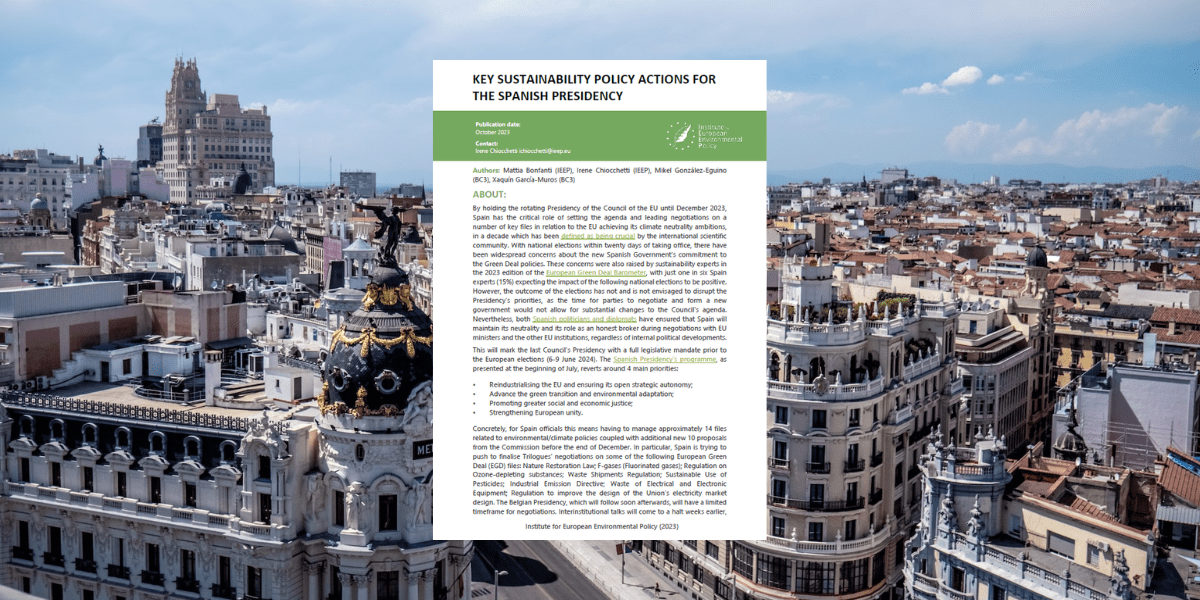AUTHORS: Mattia Bonfanti, Irene Chiocchetti, Mikel González-Eguino (Basque Centre for Climate Change – BC3), Xaquín García-Muros (Basque Centre for Climate Change – BC3)
As the last Council’s Presidency with a full legislative mandate before the 2024 European elections, Spain has the important task of concluding several files of the European Green Deal, preventing them from being left out by the future Commission.
By holding the rotating Presidency of the Council of the EU until December 2023, Spain has the critical role of setting the agenda and leading negotiations on a number of key files in relation to the EU achieving its climate neutrality ambitions, in a decade which has been defined as being crucial by the international scientific community.
With national elections within twenty days of taking office, there have been widespread concerns about the new Spanish Government’s commitment to the Green Deal policies. These concerns were also raised by sustainability experts in the 2023 edition of the European Green Deal Barometer, with just one in six Spain experts (15%) expecting the impact of the following national elections to be positive.
However, the outcome of the elections has not and is not envisaged to disrupt the Presidency’s priorities, as the time for parties to negotiate and form a new government would not allow for substantial changes to the Council’s agenda. Nevertheless, both Spanish politicians and diplomats have ensured that Spain will maintain its neutrality and its role as an honest broker during negotiations with EU ministers and the other EU institutions, regardless of internal political developments.
This will mark the last Council’s Presidency with a full legislative mandate prior to the European elections (6-9 June 2024). The Spanish Presidency’s programme, as presented at the beginning of July, reverts around 4 main priorities:
- Reindustrialising the EU and ensuring its open strategic autonomy;
- Advance the green transition and environmental adaptation;
- Promoting greater social and economic justice;
- Strengthening European unity.
Concretely, for Spain officials this means having to manage approximately 14 files related to environmental/climate policies coupled with additional new 10 proposals from the Commission before the end of December. In particular, Spain is trying to push to finalise Trilogues’ negotiations on some of the following European Green Deal (EGD) files: Nature Restoration Law; F-gases (Fluorinated gases); Regulation on Ozone-depleting substances; Waste Shipments Regulation; Sustainable Use of Pesticides; Industrial Emission Directive; Waste of Electrical and Electronic Equipment; Regulation to improve the design of the Union’s electricity market design.
The Belgian Presidency, which will follow soon afterwards, will have a limited timeframe for negotiations. Interinstitutional talks will come to a halt weeks earlier, with candidates for the European Parliament engaging in electoral campaigns. Therefore, the Spanish Presidency comes at a particularly relevant time to finalise some key dossiers under the EGD, which might face uncertain times after the EU elections and the appointment of a new Commission.
IEEP and BC3 have identified four key areas with regards to environmental policies which the Spain Presidency should focus on prior the end of its mandate:
- Strengthening nature restoration and adaptation to reach climate objectives
- Protecting EU’s soils for a sustainable land use management in the long-term
- Fostering the social aspects of energy transition package and advance on decarbonisation
- Finalising the Mercosur trade negotiations while tackling deforestation
To know more, read the full analysis.
Photo by Chris Curry on Unsplash


